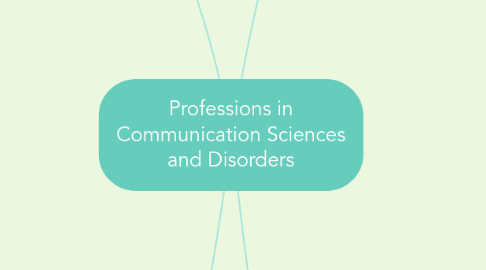
1. Audiologist
1.1. Who are they?
1.1.1. Audiologists are healthcare professionals who measure hearing ability, diagnose, and treat people with hearing, balance, and auditory disorders.
1.1.1.1. Central Auditory Processing disorder is characterized by the struggle of processing information from auditory signals.
1.1.1.2. Positional Vertigo is a balancing disorder triggered by specific changes of the position of the head
1.1.1.3. Conductive hearing loss is a hearing disorder caused by damage to the outer and middle ear.
1.1.2. They treat people of all ages
1.1.3. Audiologists practice without a prescription from other healthcare providers.
1.1.4. Audiologists fit and distribute hearing aids.
1.2. Education
1.2.1. An Audiologist is expected to be in graduate school for 3-5 years in order obtain a doctoral degree.
1.2.1.1. Audiology Doctorate (AuD)
1.2.1.2. Doctor of Philosophy Degree (PhD)
1.2.1.3. Doctor of Education Degree (EdD)
1.3. Credentials
1.3.1. Audiologists must undergo paid clinical experience, and pass a national examination, in order to qualify ASHA's Certificate of Clinical Competence in Audiology (CCC-A)
1.3.2. Audiologists do not need school certification as apposed to SLPs.
1.3.3. States require audiologists to obtain a state license.
1.4. Where do they work?
1.4.1. Audiologists work in hospitals, Audiology Clinics, Schools, and Industry.
2. Professional Aides
2.1. Who are they?
2.1.1. Are individuals who work closely with Speech-Language Pathologists or audiologists.
2.1.1.1. Speech-Language Pathology Assistants (SLPA)
2.1.1.1.1. Under the suppression of an SLP, SLPAs participate in clerical tasks and prepare materials used for assessment and treatment.
2.1.1.2. Audiology Assistants
2.1.1.2.1. Under the direction of an Audiologist, Audiology assistants can perform clerical tasks, screenings, and calibrate audiological instruments.
2.1.2. They must be supervised by an SLP and Audiologist.
2.2. Education
2.2.1. Unlike Audiologists and SLPs, they can work with an Associates and Bachelors degree.
2.3. Credentials
2.3.1. They do not have the credentials to assess the results of tests, create service plans, conduct family/client counseling, or decide when a client is ready to be discharged from treatment.
2.3.2. They do not have ASHA's Certificate of Clinical Competence (CCC)
2.4. Where do they work?
2.4.1. SLPAs can be found where SPLs work
2.4.2. Audiology Assistants work with Audiologists in audiology clinics, hospitals, industries and schools.
3. Speech-Language Pathologist
3.1. Who are they?
3.1.1. SLPs recognize, evaluate, treat, and prevent communication, language, and speech disorders.
3.1.1.1. A language disorder is the inability to properly use and understand spoken, written, and written symbols.
3.1.1.1.1. Selective Mutism is apparent when a child does not speak in some social settings where they are not comfortable.
3.1.1.1.2. Dyslexia is charaterized by difficulty reading, writing, and spelling words and comprehending symbols.
3.1.1.2. A speech disorder is the abnormal production of speech sounds as well as flow, voice quality, pitch, resonance, and duration.
3.1.1.2.1. Apraxia of Speech is the inability to articulate properly because of neuromotor difficulties.
3.1.1.2.2. Stuttering is characterized by the disfluency of speech.
3.1.1.3. Communication Disorders are the inability to receive, send and understand verbal, nonverbal and graphic information.
3.1.1.3.1. Autism is a developmental disorder characterized by difficulty interacting with others.
3.1.2. They examine the physiological, cognitive, and social aspects of communication.
3.1.3. SLPs work with people of all ages
3.1.4. SLPs treat individuals with swallowing and feeding disorders.
3.1.5. They help people who want to alter a regional or foreign accent.
3.2. Education
3.2.1. SLPs have a Masters degree or a doctorate
3.2.1.1. 25 hours of clinical observation and 350 hours of clinical practice
3.2.1.2. 9 months of paid supervised clinical experience (Clinical Fellowship Year)
3.3. Credentials
3.3.1. After receiving a Masters or Doctorate, ASHA awards a Certificate of Clinical Competence in Speech-Language Pathology (CCC-SLP)
3.3.2. Are expected to attend continuing education units. (CEU)
3.3.3. Must pass the Praxis/ National Teaching Exam exam (NTE)
3.3.4. Need public school certification
3.4. Where do they work?
3.4.1. SLPs work in hospitals, nursing homes, private practices, schools, clinics, and rehabilitation centers.
4. Speech, language, and hearing scientists
4.1. Who are they?
4.1.1. They are individuals who conduct research to further our understanding of speech and communication disorders.
4.1.1.1. Speech Scientists investigate the anatomical and physiological aspects of speech-sound production. They conduct research in order to better understand typical and atypical communication. Their research is used to improve and develop therapy techniques used to treat individuals with speech disorders. They aid in the construction of augmentative and alternative communication devices used by individuals who can not produce speech.
4.1.1.2. Language Scientists study the way children acquire language. They compare and contrast different dialects of English. They investigate language disorders in people of all ages.
4.1.1.3. Hearing Scientists conduct research regarding sound and hearing. They work with other scientists in order to develop and manufacture equipment to be used in the assessment of hearing.
4.1.1.4. Cognitive Psychologists strive to understand the memory, perception, and learning.
4.2. Education
4.2.1. Usually have a doctoral degree
4.2.1.1. PhD
4.2.1.2. EdD
4.3. Credentials
4.3.1. Some Speech, Language, and Hearing Scientists do not have ASHA's Certificate of Clinical Competence (CCC), because it is not required to conduct research in a laboratory.
4.4. Where do they work?
4.4.1. They can also work as an SLP or Audiologist.
4.4.2. Some Speech, Language, and Hearing scientists work a Professors in Universities.
4.4.3. They work in universities, government agencies, industry, and research centers.

